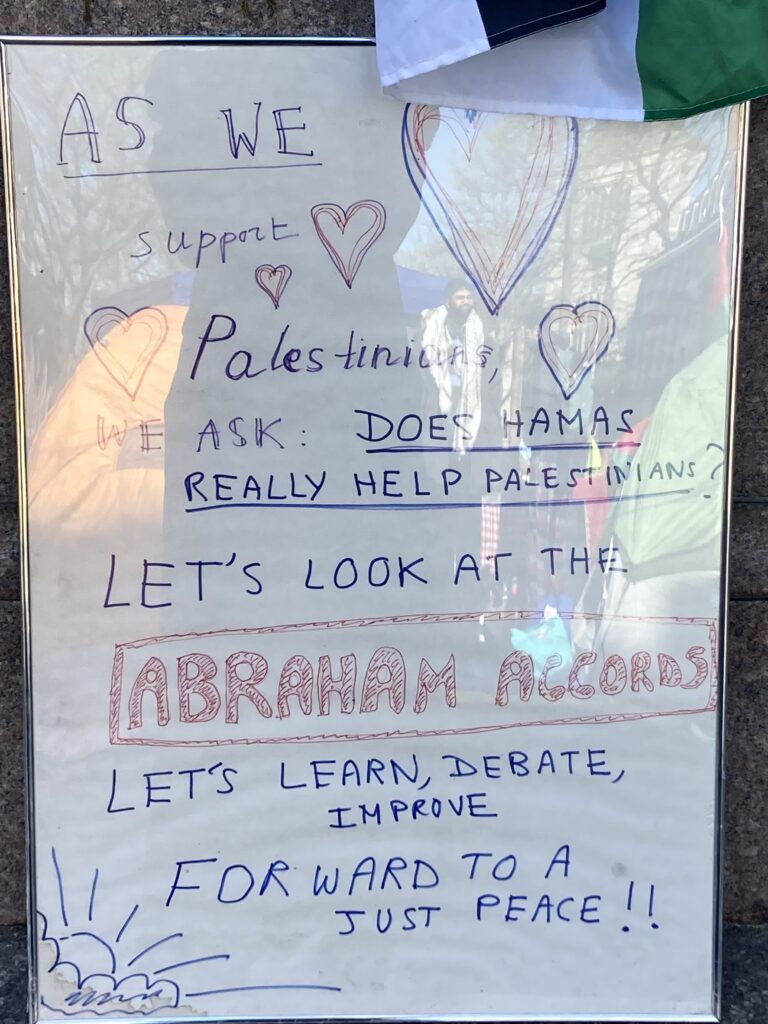Editor's Note: Anne Davenport graduated from Harvard College in the class of ‘75. She later earned her PhD at Harvard in the History of Science. Her experience teaching philosophy at Boston College came in handy this week. We are pleased to share her thoughts with you.
Thank you for your interest in my very minimal intervention at Harvard. Let me give you a small account:
- The Yard is restricted. Only Johnston Gate was open mid-morning yesterday (Friday April 26), but the security guard let me in when I showed him my ID.
- The first thing I noticed was how SMALL the camp is. Whereas the “Living wage” encampment a few years ago filled the whole Yard, this pro-Palestinian camp occupies only the small square lawn right in front of the John Harvard Statue — maybe 300m2.

- The second thing one sees is a very large banner on the ground saying, “Harvard Jews for Palestine.” When I walked to the front, I saw a leaflet taped to a tent reading “Jews against genocide.” I would love to see people engage this particular group and coax them into debating the Abraham Accords. It tells you that youthful guilt is a big part of the story (?)
- I presented them with my nicely framed poster board: “As we support (heart, heart) Palestinians, we ask: Does Hamas really help Palestinians? Let’s look at the Abraham Accords — learn, debate, improve. Forward to a just peace!”
- They rejected it (and the Accords) on the grounds that “Israel has no right to exist.” They conceded that individual Jewish families have an “indigenous” claim to living in the Middle East but denied that Israel is a legitimate state. They offered arguments about the founding of Israel, and I cited the case of Iraqi Jewish refugees to them. They vehemently rejected it, claiming that Zionists had bombed synagogues in Iraq in order to create a crisis and increase immigration into Israel.
- They argued that, as long as there is a “dominant power,” by which they mean Israel, everyone else is marginalized and there cannot be justice. I asked: “Are you at all concerned that Iran could become the dominant power? Look at what they do to girls who won’t wear a headscarf.” They dismissed this concern. They seem to believe that, if Israel is removed, something like California will spontaneously emerge.
- When I mentioned the Israeli left-wing and their long-standing efforts on behalf of Palestinians, they rejected the very notion that an Israeli could be part of a solution. I said: “But there were many Abolitionists who, by no fault of their own, were born in Dixie. Yet they organized the Underground Railroad and saved many slaves. ” Revealingly, one of them retorted: “The hero is John Brown, and he called for armed revolution!” (This, to me, reveals that they are really more concerned with warding off personal guilt than actually moving forward. We mustn’t forget how terrible guilt feels to 20 year-olds. Indeed, it struck me that the whole protest is a gigantic “Not in my name!” cry of the heart.)
- As I had to go, I said: “OK. I’ll just leave my poster at the feet of John Harvard.” They very politely asked me to take it away with me. I stood firm. We quarreled a bit. They questioned my right to do so — questioned my Harvard affiliation. I said, “Are you telling me that you, alone, have the right to put up signs? If you remove my poster, you will be practicing censorship. It has no Israeli flag on it, is not provocative: it simply invites you, as supporters of Palestinians, to think seriously about what will actually help.”





